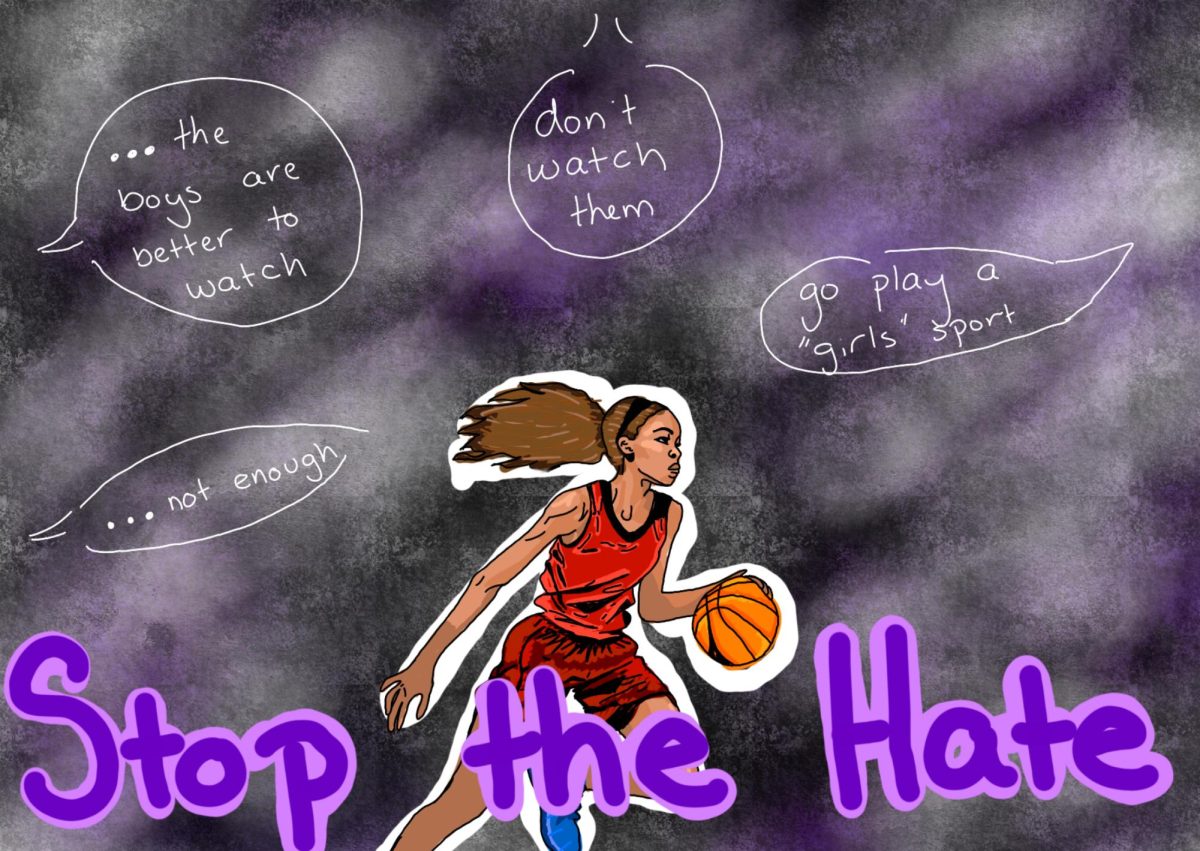In the world of high school athletics, the playing field should be a space where skill, teamwork, and dedication are unaffected by discrimination or bias. However, the reality is that across the country, sexism is often present within high school sports. From unequal funding to ingrained stereotypes, the landscape of athletics in schools is tainted by gender-based discrimination.
What does the word athlete mean? Originating from the Greek word for “contestant in the games,” the word athlete is used to describe anyone who competes in sporting competitions and is typically reserved for people with a high level of dedication, skill, and fitness.
Not once are gender or sex mentioned by this definition, yet it seems as though such limits sometimes exist. Sports aren’t limited to men.
We’ve grown up in a world where certain sports are labeled by society as “for boys” or “for girls.” At a young age, I grew up being told by teenagers and kids around me that football was a boy’s sport that I wasn’t allowed to play, and that volleyball is the ideal girl’s sport.
This isn’t just an unfair statement to make; it’s restricting.
Why should anyone be stereotyped into participating in a certain sport to fit societal norms? We need to break free from these outdated notions and let our passions and talents guide us, not societal expectations.
For the female athletes who’ve already made this step in breaking down societal expectations, high schools and society need to support them instead of shutting them down. To criticize a female athlete for participating in what they love isn’t only unjust, but also small-minded.
There’s times when women are told they need to play “girl” sports, that no one wants to watch them, that they’ll never be good enough, and more. We need to do better. Not only is it about fairness and respect, but it’s also about creating a high school sports scene where everyone is valued, supported, and celebrated for their hard work and dedication.
When comparing girls’ and boys’ sporting events, many within high school communities often refer to the idea that boys teams are stronger and faster than the girls. This is their explanation as to why boys are more enjoyable to watch when it comes to competing, but this shouldn’t determine the turnout for games. While I can say it is true that men are anatomically more physically powerful than women are, there’s more to the game than biology-based abilities.
Biologically, men have larger hearts and lungs, allowing for them to also have a greater number of red blood cells, which is linked to the production of testosterone. This gives them the advantage endurance-wise when running in terms of oxygen delivery throughout the body. While men have that advantage, women are shown to better be able to manage glucose and store it in muscle. This allows for it to be used more effectively when taking part in endurance events.
The biological difference between men and women often contributes to varying physical attributes, but these distinctions don’t define an individual’s capability or potential in sports. To acknowledge these differences is important, but we need to know that the physical factor isn’t everything; sports encompass strategy, skill, determination, and mental fortitude.
Why is it that we allow for people to say not to attend women’s games and say that they shouldn’t participate in sports in the first place? This has happened a number of times in our high school alone this year. Why is it that we allow for people to use profanity and sexual comments when discussing women’s sports?
This isn’t to say that we don’t have supporters in women’s sports. However, we need to find ways to eliminate the amount of down-talking that takes place on a regular basis. Right now, there is more negative attention than there is positive attention in the sports industry in regards to women’s sports.
The hate should stop now.
The importance of fixing this problem now is that it will reshape the normality of everyday lives for women in the future. We want to create an environment for younger female athletes to feel welcome and confident in the sports industry. It’s vital that we try to eliminate sexism by starting with our younger generation, as they are the ones who will shape our world later. We should rewrite the narrative to create a sports scene where fairness, respect, and inclusivity are the highlight.
Women’s sports are growing and it’s necessary that with this growth we provide support. During the 2023 NCAA tournament alone nearly 10 million viewers tuned in for the final game between Iowa and LSU, which is up 103% from the previous year. The WNBA draft is another event that gained an increase in its audience viewership with 42% between 2022 and 2023.
As women’s sports have grown, we can also see that there are more people attending games and here at La Salle, this is an area that could use improvement. What I want to clarify is that I’m not saying don’t go to boys games. I am saying that when there’s a girls home game against our largest rivals, Wilsonville, and there’s also an away game at Wilsonville for the boys, make more of an effort to show up to the girls game. Or when we have a double-header game, it shouldn’t be that there’s more fans going to the earlier boys game and leaving before the girls game. This isn’t the mindset we should have; instead we should support both genders in sports.
It’s heartbreaking as a female athlete to have to perform in such a quiet gym and knowing that no one will see all the hard work you’ve done. The adrenaline rush that occurs for any athlete when the crowd cheers for them is unmatched by any other feeling you can get from sports. This experience should be granted to all athletes — not just the men.









Christine Babinec • Jan 4, 2024 at 8:04 am
What a fantastic article and call to action! Research demonstrates that if the gender of a player is unknown, spectators are as excited by the game/sport whether the players are male or female. I will send you a link as they are not allowed in the comments. Great work!